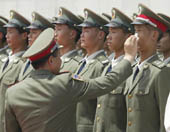China ready to attack Taiwan
Tokyo and Washington issued a joint statement in February listing for the first time the peaceful resolution of the Taiwan issue
China's parliament enacted a law Monday authorizing force to stop rival Taiwan from pursuing formal independence, sparking outrage on the self-governing island and warnings that the measure would fuel regional tensions. 
The ceremonial National People's Congress passed the law despite U.S. appeals for restraint. It came a day after President Hu Jintao called on China's military to be ready for war and followed a 12.6 percent increase in the country's defense budget for 2005.
Premier Wen Jiabao said the mainland still wants to unite peacefully with the island and doesn't want to disrupt the status quo.
"It is not targeted at the people of Taiwan, nor is it a war bill," Wen said at a news conference. But he also warned outsiders not to get involved: "We do not wish to see foreign interference."
A Taiwanese government spokesman rejected the measure as a "serious provocation."
"It also brought emotional pain to the Taiwanese people, restricts Taiwan's freedom and democracy, and has a serious impact on security in the East-Asia region," said Joseph Wu, chairman of the island's Mainland Affairs Council, which handles policy toward Beijing.
In a session broadcast on national television, NPC delegates burst into applause after the law was approved by a 2,896 to zero, with two abstentions. The body usually votes overwhelmingly for Communist Party policies, but the emphatic result was meant to send a message of the intensity of Beijing's sentiment on the issue.
Taiwan and China split in 1949. Beijing has threatened repeatedly to attack if it tries to make its de facto independence permanent. The United States is Taiwan's biggest arms supplier and could be drawn into any conflict over the island.
A leading Taiwanese lawmaker criticized the measure as a "savage law." It shows that China "feels futile and doesn't know how to deal with Taiwan's democracy and freedom," said Chen Chin-jun, a member of the ruling Democratic Progressive Party.
"We can clearly see that Taiwan and China ... are not one China. They are two Chinas or one country on each side," Chen said in Taipei. "Whatever law they passed, Taiwan has its own sovereignty, government, country and democracy." The law says China would "employ non-peaceful means and other necessary measures to protect China's sovereignty and territorial integrity." It said such steps could be taken if Taiwan declared formal independence, if "major incidents" occurred causing Taiwan to separate permanently from China, or if "possibilities for a peaceful reunification should be completely exhausted."
The law doesn't give details of what specific developments might trigger an attack. It adds no new threats or conditions, but it codifies the measures for authorizing military action.
Japan warned that the law could increase regional tensions.
"We are concerned about negative effects of the bill on the peace and stability in the Taiwan Straits and the relationship between the two sides, which had been improving," said Chief Cabinet Secretary Hiroyuki Hosoda.
Tokyo and Washington issued a joint statement in February listing for the first time the peaceful resolution of the Taiwan issue as a joint strategic objective. China has spent heavily in recent years to modernize the PLA, focusing on adding high-tech weapons to extend its reach and back up threats to attack Taiwan.
Many Chinese are strongly nationalistic and support unification with Taiwan. But because China allows no opposition politicians or free press, it was difficult to gauge the level of genuine support for the law.
On a Beijing street, a migrant from the poor inland province of Anhui who was selling pirated DVDs showed little interest in the government's statements about Taiwan.
"We're ordinary people," said the man, who would give only his surname, Ye. "We worry about what to eat, what to wear."
It is noteworthy that the Dalai Lama, the Tibetan leader, stated that he was ready to stop struggling for Tibet's independence to let the Tibetans gain profit from China's dynamic economic development. The Tibetan leader stated that he was not a follower of separatism: “Tibet is a part of China, it is an autonomous region of China,” the exiled leader said in an interview, which was published in Hong Kong's South China Morning Post.
The Dalai Lama believes that the Tibetan culture and Buddhism is a part of the Chinese culture. “Tibetans are eagerly waiting for modernization. It is in their interests to become a part of China, under the guidance of the Chinese government, to have the Tibetan culture, spirituality and natural environment preserved,” the leader emphasized in the interview to the Hong Kong newspaper.
The 69-year-old leader acknowledged that he was seeking only religious and cultural autonomy for Tibet. He specified that he declined the political, economic and diplomatic independence for the region.
Subscribe to Pravda.Ru Telegram channel, Facebook, RSS!



